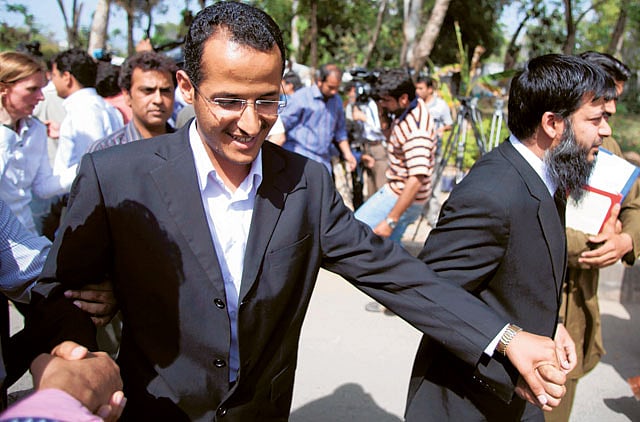Islamabad: A Pakistani court yesterday sentenced Osama Bin Laden's three widows and two of his daughters to 45 days in jail for illegally staying in the country, a month before the first death anniversary of the Al Qaida leader.
The court also fined them $110 (Dh404) each after holding the trial in a house designated as a sub-jail where they had been residing under tight security. The judge ordered the authorities to arrange their deportation once they have served their sentences.
Bin Laden's widows, along with their children, have been in Pakistani custody since he was killed during a US raid on his compound in the Pakistani town of Abbottabad, where he had been living with his family for six years.
Defence lawyer Mohammad Aamir Khalil told reporters the 45-day imprisonment will be counted retrospectively from March 3, when they were formally indicted and that the deportation process could be completed within two weeks.
In good health
A top official of the Pakistani Interior Ministry has been ordered to arrange their deportation, the counsel said, adding that the convicts were in good health.
Zakaria Ahmad Abdul Al Fatah, the brother of Bin Laden's youngest wife, Amal Ahmad Abdul Fatah Al Sada, 30, said the fines of $110 each had been paid.
Al Fatah said the court had also directed the government to arrange the necessary documents for their repatriation to their respective countries.
Bin Laden's two Saudi wives have been identified as Khairiah Sabar and Siham Sabar. The three women have an undisclosed number of children among them, but only those above 12 were charged.
The case treads on a number of sensitive issues for Pakistan. The army faced rare domestic criticism following the US raid that killed the Al Qaida chief because they were powerless to stop it. Citizens also said Bin Laden's presence in the country for so long pointed to the military's complicity.
Bin Laden's family lawyer Khalil said Yemen has consented to Amal's return, but he is still in discussions with Saudi officials over Khairiah and Siham's repatriation.
Islamabad was outraged by the US raid that killed Bin Laden because it was not told about it beforehand. Pakistani officials have said they had no idea the Al Qaida chief was in Abbottabad, something many in Washington found hard to believe because his compound was located close to Pakistan's equivalent of West Point.
Fresh questions
But details uncovered recently from the interrogation of his 30-year-old Yemeni wife, Amal, raised fresh questions about how Bin Laden was able to remain undetected for so long in Pakistan after the September 11, 2001 attacks.
After leaving Afghanistan, Bin Laden lived in five safe houses over the course of nine years while on the run in Pakistan and fathered four children — two of them born in government hospitals, according to Amal's interrogation report.
Amal's account says she flew to Pakistan in 2000 and travelled to Afghanistan where she married Bin Laden before the September 11 attacks.
After that, the family "scattered" and she travelled to Karachi. She later met up with Bin Laden in Peshawar and then moved to the Swat Valley, where they lived in two houses. They moved one more time before settling in Abbottabad in 2005.
The compound in Abbottabad was a crowded place, with 28 residents — including the 54-year-old Bin Laden, his three wives, eight of his children and five of his grandchildren, according to Brigadier Shaukat Qader, a retired Pakistani army officer who spent months researching the Bin Laden raid.
The Bin Laden children ranged in age from his son Khalid, who was in his 20s and was killed in the raid, to a three-year-old born during their time in Abbottabad, Qader said.
There was tension between Bin Laden's youngest wife, Amal, and his oldest, Khairiah, who arrived in Abbottabad in early 2011 after being held in Iran for about a decade, the brigadier said. Some in the family were convinced Khairiah intended to betray the Al Qaida leader.
— With inputs from AP
Sign up for the Daily Briefing
Get the latest news and updates straight to your inbox
Network Links
GN StoreDownload our app
© Al Nisr Publishing LLC 2026. All rights reserved.
